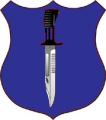I read the article and agree with other comments that it is well written and researched.
That said IMO the article itself is misguided. I got the impression that the author felt NCO's run smoke sessions on a whim outside thier inherent authority or justification. Looking at the time he spent in service (listed in the notes on the article, I think it was a four year enlistment) I doubt he got that far in the ranks, I dont say that as a slight, I say that to highlight the limited perspective one Soldier gets in one unit for four years. Is the line between on the spot corrections/ additional training blurry... sure. But I have never run a smoke session because I was bored or though it was funny, or out of an obligation to generations of Soldiers before me. I do it to maintain discipline and ultimately because I care for the troops in my charge. (sorry ,if that sounds dramatic but from my foxhole it is true). Giving a physical challenge to my Soldiers in lieu of UCMJ is a lot like correcting my own children. I don’t want to do it, I love and care for them both, but it is necessary for their development, and in my mind looks out more for their welfare in both cases.
For example:
You have a young Soldier E-1/E-4 who leaves his weapon at a training site. Should I recommend UCMJ punishment? Okay, he is 21 married with two kids, what am I signing him up for? He loses pay, so he can’t meet financial obligations without the embarrassing process of AER and ACS loans and grants. Not to mention the time lost by his Squad Leader and PSG in Trial Defense Service appt's., loan application forms, and “special time" with the Commander and 1SG. The Soldier also loses time with his family as he performs extra duty.
Or, should I disassemble his weapon, giving one piece to each NCO in the platoon. The Soldier accepts a physical challenge from each NCO as he reassembles his weapon piece by piece, painful...yes, but he won’t forget his weapon again, plus it still serves as a reminder to other Soldiers who witness that proper accountability for equipment is important.
If I received UCMJ every time I stepped on my own crank while growing up in the Army I would probably still have not received a pay check (16 years later), and might find the need to extend my term of service to complete my extra duty! I needed discipline.
Thankfully I had NCO's who smoked the ever living crap out of me, when I screwed up. As I went to the promotion board for SSG I had no blemishes on my records of recorded UCMJ proceedings.
Soon technology will not be able to overcome the soft underbelly of the Nintendo generation

Somebody needs to give
responsible tough love, if you don’t have the cajones to do it, or that hurts your sense of morality/justice then kindly step aside.





 "A Sherman can give you a very nice... edge."- Oddball,
"A Sherman can give you a very nice... edge."- Oddball, 









Bookmarks